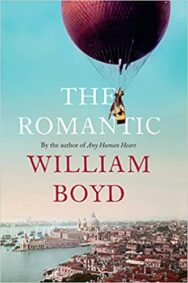‘The fluidity and randomness of life – that great Boydian theme – are all here in abundance.’
David Robinson enjoys rattling through the nineteenth century with William Boyd’s hero in his latest novel, The Romantic.
The Romantic
By William Boyd
Published by Viking
Tragedy, comedy, hero’s journey, rags to riches, rebirth, overcoming the monster, voyage and return: according to screenwriting orthodoxy, every story that there ever was or can be springs from those seven templates. In his latest novel, The Romantic, William Boyd takes that a step further. All seven plot types happen to just one character.
His name is Cashel Greville Ross, and he begins life in Co Cork in 1799, apparently an orphan, although in adolescence he finds out that his governess aunt is his mother, and his father is the local landowner. Freed from the predictable obligations of class and rank but raging at having been so comprehensively lied to by his parents, he joins the 99th Regiment of Foot (Hampshires) as a drummer. Look at the dates, and you just know he’s going to end up at Waterloo. He does – though as he approaches the battlefield, the name on the nearest signpost makes him think that one day the Battle of Nivelles will go down in history.
The randomness of the past this hints at is a repeated theme in the novel: it’s only because an army surgeon is busy elsewhere, for example, that the wounded Ross limps away from the battlefield with two legs rather than one. These simple twists of fate soon start to pile up: being a Waterloo veteran not only gives Ross a certain cachet when he subsequently serves in the East Indian Army, but also impresses Lord Byron (who wants to be a war hero more than anything) and endears him to Shelley’s sister-in-law Claire Clairmont, with whom he has an affair in the weeks before the poet drowned.
By this stage, we’re 130 pages in, and only now does he meet the love of his life, the Contessa Rafaella Rezzo, whom he meets at the party held in his honour by Byron in Pisa. (Just in case he didn’t get the message that she’s keen too, she sends him a letter containing a scented lock of pubic hair.) More of her later.
It’s still only 1822, and the very first page of the novel has told us that there’s another six decades to go. Reading The Romantic it sometimes seems as though, for Boyd, these are rather like an Olympic gymnastic floor exercise map, in which extra marks are given for covering as much of it – here, both time and space – with as much flamboyant control as possible. True, there are some parts of the planet he never reaches: South America, despite Ross’s repeated longing to set up a commune in Venezuela, remains unvisited, as does the Far East and the northern tundras. But his record in Africa, India, America and most of Europe is impressive, not least because he doesn’t just visit those places but lives there too.
Just as Olympic floor gymnasts have to work hardest on the four tumbling passes (those double back flips and interlinked twists, usually on the diagonal line across the square mat) allowed in their routine, so Boyd pays most attention to those moments when Ross sets himself up in a different line of work, usually in a different continent. If he can ‘land’ those scenes, the novel, however seemingly preposterous, may just about work.
Ross’s life as a soldier is the first of these, and probably the most familiar: after all, Stendhal (a key influence on this novel), Thackeray, Conan Doyle, and many other novelists have already made Waterloo a very crowded literary battlefield, even if few writers have followed Boyd deep into the 3rd Kandyan war (1817-18) in mountainous central Sri Lanka, where Ross is made to confront an acute moral dilemma.
My own favourite ‘landing’, though, is Ross’s attempt to set up a farm in west-central Massachusetts, which is saved from failure by the realisation that there is a healthy market for the pure, freshwater ice from his lake, not just in America but in pre-refrigeration Britain too. (Who knew?) But whether there, or in his attempt to wrest back the claim to have discovered the source of the White Nile in what is now Uganda from the English explorer John Hanning Speke, or in Ross’s accidental participation in smuggling Greek artefacts from Turkish-controlled islands such as Rhodes, Boyd’s set-up is invariably well worked, plausible and intriguing.
No-one should be surprised. When it comes to making his fiction so believable that it just slides into the past, Boyd has form: indeed, it’s his favourite literary game. In many of his novels, he makes a point of blurring the line between fact and fiction to make them near-indistinguishable. In Any Human Heart, for example, his fictional protagonist meets any number of real-life people, from Virginia Woolf to the Duke of Windsor, in a series of encounters we can also follow across footnotes. In Love is Blind, the real-life Chekhov isn’t named, but there’s no doubt at all who that consumptive Russian staying at Nice’s Pension Russe in 1897 is meant to be. And just in case you’ve forgotten how easy Boyd finds it to pull the wool over the eyes even of people who use them for a living, remember how completely his fictional monograph Nat Tate, An American Artist 1928-1960 fooled the art world a quarter of a century ago.
When Ross meets the Contessa, we are told, ‘he knew as an animal knew that he had found his maid’. Already his background has freed him from a conventional future, already his parents’ lies have turned him into a straight arrow; when he meets the Contessa nothing matters apart from her, there can be no future apart from her. Quite why the course of true love doesn’t run smoothly would require a spoiler; but if it hadn’t have done, the book Ross then writes about their impossible relationship (a bit like Stendhal’s On Love) would never have become a London bestseller; and his publisher wouldn’t have felt so free to gamble and … The plot spins, the pages turn.
The point of it all isn’t, I think, entertainment alone, though The Romantic offers that on a panoramic scale. Wherever in the world Ross finds himself, and whatever he finds himself doing, he is forever rising or falling. His career is kinetic, explosive, spectacular, and without any kind of safety net. People die even more unexpectedly than they do now, can be jailed for debts for years without hope of freedom, contracts can turn out to have devious small print. The fluidity and randomness of life – that great Boydian theme – are all here in abundance. Yet if you want, to paraphrase Marvell, to see someone tearing their pleasures with rough strife through the iron gates of life, Cashel Greville Ross (1799-1882) is your very man.
The Romantic by William Boyd is published by Viking, priced £20.
ALSO IN THIS ISSUE

 The Banes O’ The Turas
The Banes O’ The Turas
‘An wi yon beamin glow ayont wirds, Hamish fer aye oor lad o pairts bides eternal. ‘

 Scotland’s Transnational Heritage
Scotland’s Transnational Heritage
“There is no one single national history. National histories are not fixed in any particular time or …













